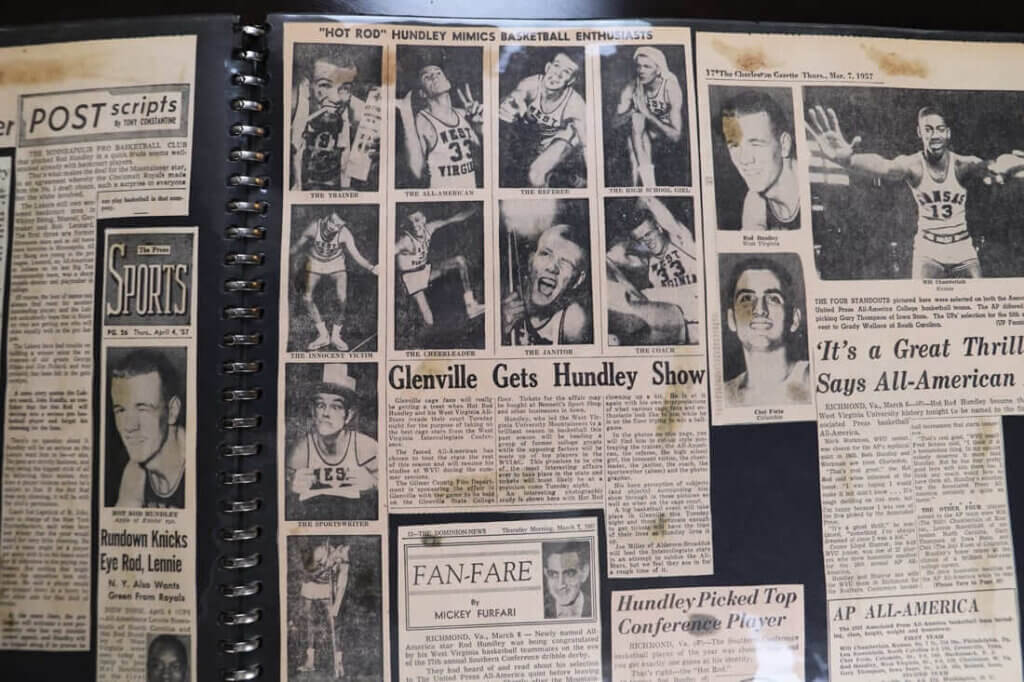Behind the documentary Hot Rod, released April 2018.
When “Hot Rod” Hundley died in March 2015 at the age of 80, Morgantown production company Pikewood Creative immediately started planning a documentary to honor the beloved WVU basketball great. They saw an opportunity to kick off their reporting: Jim Nantz, Hundley’s former broadcasting partner for the Utah Jazz, was going to be in the state in July for the Greenbrier Classic.
Over the following two and a half years, Pikewood’s crew traveled seven states to interview more than 30 people on camera and talked with many others over the phone. Those interviews didn’t always come easy: Some took an entire year to schedule.
The small Pikewood team consisted of director and editor Dan Lohmann, producer Tony Caridi, assistant producer and Tony’s son Matt Caridi, and a few helpers, including Dale Miller and John Raese. “We did this at the absolute bare minimum number of personnel, and he did 95 percent of the work,” Tony Caridi says, gesturing to Lohmann.
Before he was superstar Hot Rod Hundley, he was Rodney Clark Hundley of Charleston, West Virginia. Born in October of 1934, Hundley had a rough start to life. His mother worked as a waitress and had to have others watch him while she worked for very little pay. She put him up here and there while she worked, eventually finding an elderly couple to take care of him while she went to Washington, D.C., to find work. He spent his adolescence playing basketball at the local YMCA. The Y became his home and basketball his escape. As a junior and senior in high school, Hundley lived on his own at a hotel. He cried himself to sleep at night, but put up a happy-go-lucky facade for friends.
Hundley enrolled at WVU in 1953, and his basketball career blossomed under the guidance of his coaches. When “Hot Rod” was on the court—the nickname was in place by his sophomore year— the streets of Morgantown were dead: Everyone was in the Mountaineer Field House watching his behind-the-back passes, shots from one knee, and other antics. Hot Rod displayed the skill of a Harlem Globetrotter, giving the fans, referees, and other players shows they would never forget. “People would come in droves to see him,” former WVU basketball star Jerry West said in the film.
In 1957, the Cincinnati Royals used their first overall draft pick on Hundley, but then immediately traded him to the Minneapolis Lakers. His antics on the court slowed in the NBA setting, but they never stopped off the court. After six seasons with the Lakers and a stint selling shoes for Converse, he landed a role as an analyst with legendary Lakers announcer Chick Hearn. And that’s where he found his niche.
During some turbulent times in the organization, then–head coach Frank Layden ran a poll to find the most popular player on the Jazz. The people of Utah voted Hot Rod as one of their favorite players— as the announcer. Fans loved him because he had the feel of the game like no other announcer. And listeners adored his Hot Rodisms, like hippity-hop, dribble drive, frozen rope, no-look pass, yo-yo dribble, and the famous “You gotta love it, baby.”
After 35 seasons and 3,051 games called, Hundley retired in 2009 as the voice of the Utah Jazz. Soon after, his legendary number 33 was retired at the WVU Coliseum. During the ceremony, after many years off the court, Hot Rod took his well-known hook shot that bounced off the rim, then the backboard, and then gently, like a feather, fell into the net. “He loved this moment in his life,” Jim Nantz said in the documentary. “He came back to West Virginia and, of course, he was embraced. The fans in West Virginia are incredible and they are so loyal to their own, and he just bathed in that embrace.”
Not only are West Virginia fans fiercely loyal, but they’re also proud. Proud of their own and even more proud of those who reflect positively on the state. That’s just what Hot Rod did. He gave West Virginia a name and brought Morgantown together in a way no one ever had. Hot Rod was No. 33 on the court, but No. 1 in the hearts of all West Virginians.
“What struck me,” says Tony Caridi, “was that almost 60 years after he had bounced a ball in West Virginia, he is still so revered by those people who knew and saw him as a player in West Virginia.” West Virginians stand a little bit taller when one of their own is mentioned, Lohmann interjects, “and Hot Rod Hundley stands way up at the top of that list.”
Hundley’s legacy goes beyond the court and microphone. Late in his life, he established a basketball scholarship at WVU in his name to provide opportunities for kids in situations like his.
The 90-minute documentary Hot Rod premieres April 3 at 7 p.m. on AT&T SportsNet–Pittsburgh and April 16 at 8 p.m. on West Virginia Public Broadcasting. It will also be available for streaming in the near future.
written and photographed by JULIAN WYANT
